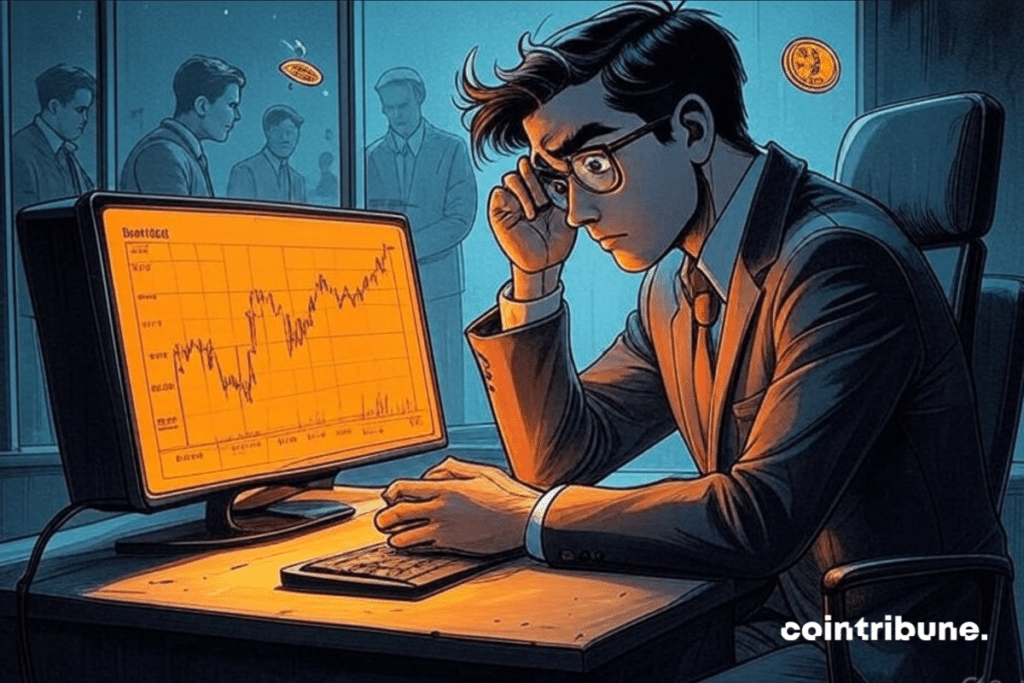BTC/USD: Bitcoin Eyes a New High Against the Dollar
Despite some profit-taking, the bullish pressure remains strong. A new record is looming for bitcoin.

In Brief
- Israeli-Iranian strikes and the threat to close the Strait of Hormuz boost bitcoin amid inflation fears.
- An oil shock could push inflation to 5%, reinforcing bitcoin’s appeal as a safe haven.
- Institutions and some countries are accumulating bitcoin, supporting its rise despite profit-taking by tourists above $105,000.
The Middle East Afire
Markets are nervous. The cause: Israel’s surprise strikes against Iranian nuclear infrastructure alongside the assassination of generals and nuclear scientists.
Iran responded by launching the “Rising Lion” operation. Several strategic sites such as the Dimona nuclear reactor, Tel Aviv’s financial center, the Ministry of Defense, military airbases, Mossad headquarters, Ben Gurion International Airport, Haifa port, and a gas platform have already been hit.
Ayatollah Ali Khamenei has promised a “severe response”:
“Do not think that they [Israel] have struck and it’s over. No. They have triggered the war. We will not let them get away without consequences.”
Uncle Sam has since rushed to the aid of Benjamin Netanyahu, who fled to Greece. By the way, the Israeli Prime Minister is still subject to an international arrest warrant by the ICC…
Donald Trump threatened Ali Khamenei with these words:
We know exactly where the “supreme leader” is hiding. […] We will not eliminate him, at least not yet.
Donald Trump
The fear now is that the United States will provide military support. The Iranian Ministry of Foreign Affairs warned on Wednesday that any American intervention would trigger “a total war” in the region.
Iran could decide to increase pressure by closing the Strait of Hormuz, through which 20% of the world’s oil flows. That means 20 million barrels per day, representing more than 30% of maritime oil flows.
These geopolitical tensions are a godsend for bitcoin since the economic consequences of a worst-case scenario are highly inflationary for the West.
Bitcoin and the Worst-Case Scenario
The closure of the Straits of Hormuz and Bab el-Mandeb would be a very inflationary event. Oil prices could climb up to 120 dollars per barrel. JPMorgan even mentions a scenario of 130 dollars.
Such an oil shock would quickly push up global food prices. This was the case in 2007 following the peak of conventional oil. This resulted in an increase of over 20% in the FAO food price index. Food prices indeed depend on the increased costs of fertilizers and the fuel needed for their transport.
Inflation could rise to about 5% globally in the scenario of a total blockade of the strait. Though this is unlikely. The reason being most oil is destined for Asia, especially China, an ally of Persia:
Nevertheless, the fear of an inflation shock is on everyone’s mind. No one has forgotten the monstrous inflation of the past five years. Here are the inflation figures in the United States over five years:
- Medical care: +12%
- Clothing: +14%
- New cars: +21%
- Food: +23%
- Housing: +27%
- Electricity: +37%
- Transportation: +49%
- Gas: +54%
- Gasoline: +69%
- Car insurance: +84%
The figures are similar in the Old Continent, and often worse in the rest of the world.
It is therefore very likely that bitcoin will see a renewed interest from the masses eager to protect themselves against inflation. Especially since the bad press bitcoin may have suffered is gradually fading.
Institutions Accumulate Behind the Scenes
While waiting for renewed interest from small investors, institutions continue their buying. They are reassured by the United States, which is about to strengthen its strategic reserve of bitcoins.
About 236 companies currently hold more than 1.2 million bitcoins, or about 5.7% of the total supply. This BTC treasury is up 20% year over year. And this comes after doubling in 2024 alone.
In total, more than 1.5 trillion dollars could be placed in bitcoin by S&P 500 companies. Microsoft and Facebook have said no, but rumors say Amazon is considering it and Tesla could double down.
Also note that the US Senate has just voted in favor of the GENIUS law. It will cement the existence of stablecoins if the House of Representatives gives its green light. The Bitcoin Act vote, which plans to purchase one million bitcoins, is now awaited.
Similarly, South America is also on board. The bill proposing to allocate up to 5% of Brazil’s foreign exchange reserves (370 billion dollars) is on the deputies’ desks. Brazil could become the second G20 country to make bitcoin a reserve currency. South Korea is also considering it.
Europe cannot say the same. The Czech central bank would like to take action, but the ECB and Christine Lagarde oppose it. Furthermore, the proposal to mine bitcoins using surplus electricity from French nuclear plants was just rejected by Parliament. Such a waste.
Overall, the horizon is clearing. Tourists take profits above 105,000 dollars, but bullish pressure remains strong.
Don’t miss our article: Bitcoin: “Thousands of Companies” About to Cross the Rubicon.
Maximize your Cointribune experience with our "Read to Earn" program! For every article you read, earn points and access exclusive rewards. Sign up now and start earning benefits.
Bitcoin, geopolitical, economic and energy journalist.
The views, thoughts, and opinions expressed in this article belong solely to the author, and should not be taken as investment advice. Do your own research before taking any investment decisions.